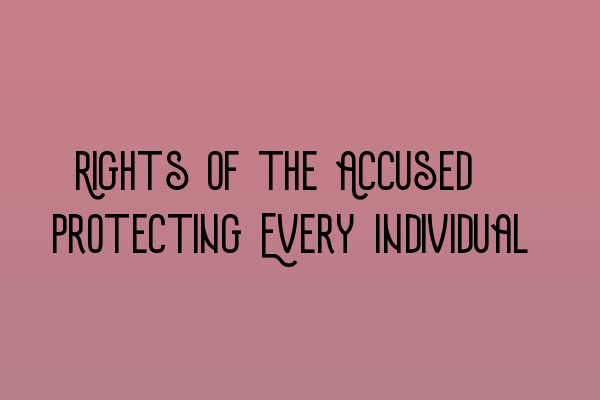Rights of the Accused: Protecting Every Individual
When it comes to the criminal justice system, one of the most fundamental principles is the protection of the rights of the accused. In a society that values fairness and justice, it is essential that every individual, regardless of their guilt or innocence, is afforded certain rights and protections. These rights not only ensure a fair trial but also serve as a safeguard against the abuse of power by law enforcement agencies and the prosecution.
The Presumption of Innocence
One of the cornerstone principles of criminal law is the presumption of innocence. This means that every person accused of a crime is considered innocent until proven guilty. This presumption places the burden of proof squarely on the prosecution, requiring them to provide evidence beyond a reasonable doubt in order to secure a conviction.
While this principle may seem obvious, it is crucial in protecting individuals from unjust convictions. Without the presumption of innocence, individuals could be deemed guilty merely based on accusations without proper evidence. This would create a system ripe for abuse, where anyone could be targeted and condemned without a fair chance to defend themselves.
The Right to Legal Representation
Another essential right of the accused is the right to legal representation. Every individual facing criminal charges has the right to be represented by a solicitor who can provide them with guidance, support, and expert legal advice throughout the legal process.
Having legal representation is crucial for ensuring that the accused understands their rights and can effectively navigate the complexities of the legal system. A solicitor can help build a strong defense strategy, challenge evidence, and advocate for their client’s interests both in and out of the courtroom.
Without legal representation, individuals may be at a disadvantage, unable to fully comprehend the charges they face or exercise their rights effectively. This right helps balance the scales of justice by providing the accused with a fair chance to defend themselves.
The Right to a Fair Trial
A fair trial is at the heart of the criminal justice system. The right to a fair trial guarantees that every individual accused of a crime has the opportunity to present their case before an impartial judge or jury.
This right includes several key components, such as the right to confront witnesses, the right to cross-examine evidence, and the right to present evidence in one’s defense. It also encompasses the right to be heard in court, the right to a public trial, and the right to a speedy trial.
These rights work together to ensure that the accused receives a fair and impartial hearing, free from any undue influence or bias. They help maintain trust in the system and protect individuals from being subjected to arbitrary or unfair treatment.
Protection Against Self-Incrimination
A crucial right for the accused is the protection against self-incrimination. This right allows individuals to remain silent and not testify against themselves during the legal proceedings. This principle is enshrined in the well-known phrase, “the right to remain silent.”
This right prevents individuals from being forced to provide evidence or answer questions that could potentially incriminate them. It serves as an important safeguard against coerced confessions and helps ensure that the accused’s statements are voluntary and trustworthy.
The Right to Appeal
In the event of an unfavorable outcome, the right to appeal provides the accused with an avenue to challenge a conviction or sentence. This right allows for a higher court to review the decision made by the trial court and assess whether any errors or injustices occurred.
Appeals can be made based on legal errors, procedural irregularities, or the discovery of new evidence. They provide an opportunity for individuals to have their case reexamined by a higher authority and potentially secure a more favorable outcome.
Conclusion
The rights of the accused are of paramount importance in any fair and just criminal justice system. They serve as a safeguard against the abuse of power and ensure that every individual is afforded a fair trial and the opportunity to defend themselves.
By upholding these rights, society can maintain trust in the legal system and ensure that justice is served. As solicitors and legal professionals, it is our duty to protect and advocate for the rights of the accused, providing them with expert representation and support throughout the legal process.
For more information on the SQE exam and essential study materials for aspiring solicitors, check out our related article: SQE Exam Prep: Essential Study Materials for Aspiring Solicitors.
Interested in understanding the format of the Solicitors Qualifying Examination? Read our comprehensive guide: Demystifying the Solicitors Qualifying Examination Format.
If you are an international lawyer planning to take the SQE exam, check out our article on challenges and success strategies: SQE Exam for International Lawyers: Challenges and Success Strategies.
For UK entrepreneurs looking to form an LLC, we have prepared a step-by-step guide: LLC Formation Made Simple: Step-by-Step Guide for UK Entrepreneurs.
Interested in a more detailed guide on LLC formation? Check out our article: LLC Formation: A Step-by-Step Guide for UK Entrepreneurs.
